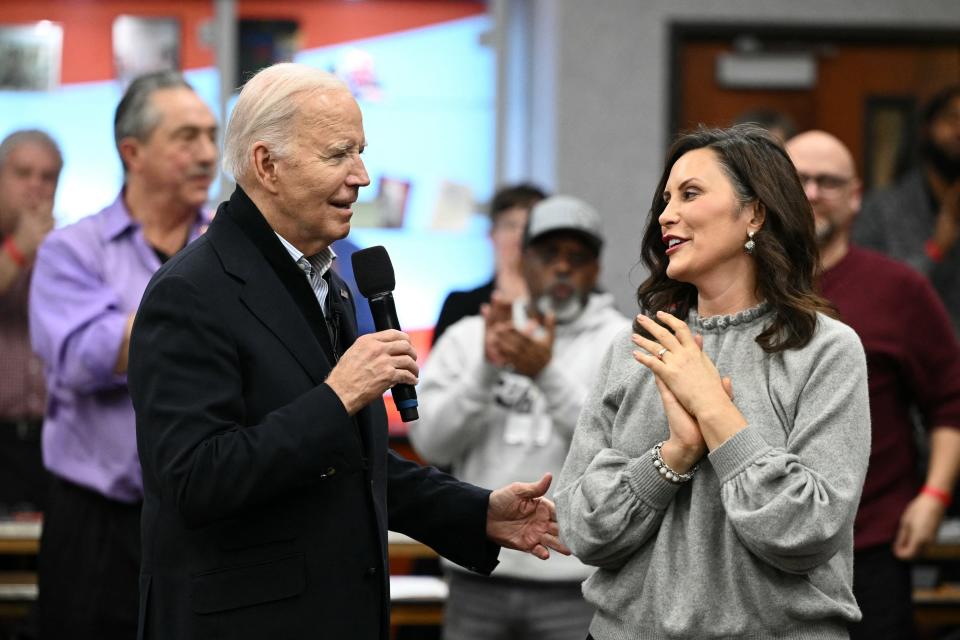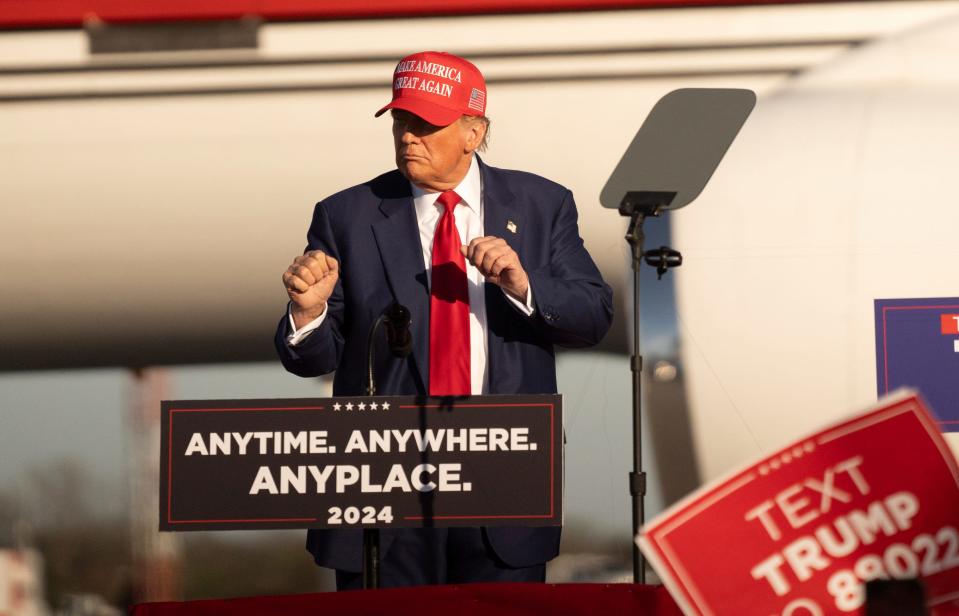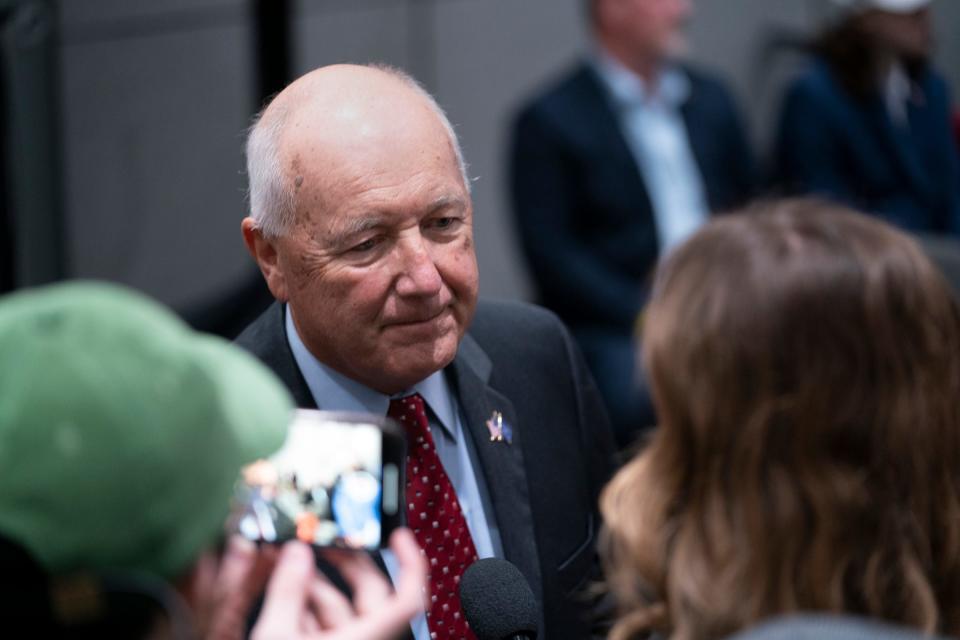Michigan is important swing state for Biden, Trump in 2024 presidential election
It wasn't so long ago, Michigan's place in presidential elections was considered almost a foregone conclusion.
From 1992 through 2012, it only backed Democratic nominees and national campaigns noticed. U.S. Sen. John McCain, as the Republican nominee in 2008, pulled up stakes early in the state, figuring it was out of reach and that he had to spend resources elsewhere. Former Secretary of State Hillary Clinton, as the Democratic nominee in 2016, was criticized for not campaigning there more frequently and ceding it — albeit narrowly — to Donald Trump that year.
Well, no one's taking Michigan for granted any more.
Former President Trump has made three visits to the state in the last 2? months, with rallies in Oakland and Saginaw counties and a news conference on immigration in Grand Rapids. President Joe Biden has made two decidedly more low-key visits with UAW members in Warren in February and at a private residence and a golf club in Saginaw in March. But Vice President Kamala Harris has been here as well, at a reproductive rights roundtable in Grand Rapids, and she's coming to Detroit on Monday to talk about the administration's economic agenda. And Biden will be speaking at the Detroit NAACP's Fight for Freedom Fund dinner on May 19 that is expected to attract thousands of people to Huntington Place.
Six months out from the Nov. 5 election, campaign ads in the state have been picking up as well.

Is all this activity unusual? This early in a presidential election, it absolutely is. Usually, it would be fall before the state would be showered with so much personal attention. But it's not unusual given that it's increasingly looking like Michigan may — and this is not an exaggeration — decide the election.
"I don't know if there is a shade of purple deeper than Michigan is," said Jamaine Dickens, a Detroit-based political consultant. "If I'm Trump, I'm thinking, I've won Michigan before and I can win Michigan again. As for Biden, the community is really polarized over the (Israel-Hamas) conflict. ... Anything's possible."
This week, in the Atlantic magazine, political analyst Ron Brownstein wrote about the election, focusing particular attention on Michigan, noting that Biden has struggled in polls despite it typically being considered the most-Democratic leaning of the so-called Rust Belt swing states that include Pennsylvania and Wisconsin. Brownstein said Biden — who beat Trump in Michigan by about 154,000 votes, or just under 3 percentage points in 2020 — has been "whipsawed by defections among multiple groups Democrats rely on, including Arab Americans, auto workers, young people and Black Americans."
No one believes that Michigan is out of reach for Biden, far from it. His campaign has poured resources and personnel into the state for voter outreach, get-out-the-vote efforts and blunting Trump's messages through copious ads from his own campaign fund, as well as other Democratic political organizations in the media at every turn. While the Trump campaign is said to have recently begun creating such infrastructure in Michigan, it hasn't been nearly as active, relying instead largely on surrogates, social media and the candidate himself.
"You can’t win without Michigan," said Michigan-based Democratic political consultant Jill Alper. "So, visit early, visit often, visit always. Leave an advance team on the ground. And organize every inch."
Recent polls also have shown the race tightening in Michigan from where it appeared to be late last year and early this year when Trump had a wider lead, in some cases by as many as 8 to 10 points. Despite Trump's claims to the contrary, his average lead has dropped to about 1 point — well within the margin of error and a virtual tie — and some recent polls have shown Biden narrowly ahead (though, again, within the margin of error).

That, by itself, doesn't explain why Michigan would be so important. What does is the national circumstances that Biden and Trump face in this year's election and the reality of Electoral College math.
Here it is in a nutshell: Four years ago, Biden won — and let's get this out of the way here, there is no credible evidence that he did not, no matter what Trump and his allies claim — a host of swing states, a group that for this story we'll limit to Michigan, Pennsylvania, Wisconsin, Nevada, Arizona and Georgia. That, plus all the other state outcomes, gave Biden an Electoral College victory over Trump of 306-232. A president needs 270 Electoral College votes to win.
This year, Arizona and Georgia, traditionally far more Republican-leaning states, appear as if they could be more difficult targets for Biden to capture again. Nevada, too, has appeared to be swinging more strongly toward Trump. Democratic hopes of flipping North Carolina and Florida, while possible, are long shots in an environment where Biden is still suffering from poor favorability ratings.
If Arizona, Georgia and Nevada go red, that gives Trump an Electoral College margin of 268 to 226, all else staying as it did in 2020 and not yet factoring in Michigan, Pennsylvania and Wisconsin. But that means Biden has to run the table in those states to get to exactly 270. Trump only has to win one of them. (You can play around with Electoral College combinations at www.270towin.com).
And Michigan has, for months, looked like the one that might be most likely to flip.
Why is Michigan a question mark for Biden?

Looking at the polls monitored by the Real Clear Politics website, it becomes pretty clear why there would be a focus on Michigan: Sure, right now the polling average shows Trump barely ahead, almost tied with Biden in the state. But the vast majority of polls taken in the state have shown Trump, not Biden, ahead. And those larger margins seen early this year and late last year in Michigan were not replicated in Wisconsin or Pennsylvania to any great extent.
And Biden has struggled to maintain traditionally strong Democratic margins among young voters and Black people. Among the latter, a recent FOX News poll showed Biden with support of 75% of that voting bloc but that's a far cry from the 92% support exit polls showed he received from Black voters in Michigan in 2020.
"There are conversations among grassroots men — Black men in the barbershop society — that like Trump. They just like his brand of politics," Dickens said. "Biden has been right on the issues. But for some reason, with two candidates who are essentially the same age, Biden appears old and Trump appears energetic to them."
Biden also has to contend with widespread discontent among Michigan's large Arab American and Muslim communities over his administration's continued support of Israel and refusal to demand a cease-fire to the violence in Gaza, where tens of thousands have died in counterattacks launched after Hamas attacked Israel on Oct. 7 of last year. Biden has sent campaign and staff to Dearborn to talk with leaders, but it doesn't appear to have assuaged their concerns. And while those communities might not swing an election by themselves by switching parties or not voting, they could sink Biden's chances when combined with other voting blocs, including younger voters.
Meanwhile, Trump is trying to foment displeasure with Biden on immigration, arguing without evidence that the record numbers of undocumented immigrants entering the country has led to rampant crime. He also is trying to advance claims that Biden has ruined the economy despite stock market gains and substantial job and wage growth, saying the Democratic president has let inflation run rampant and put everyday needs, like groceries and gas, out of reach for hardworking Americans.
Trump also is advancing cultural grievances, promising to cut funding for schools that teach certain theories on race relations and history, and vowing to overturn Biden administration protections for transgender students.

Then, there is the Biden administration's push to encourage — if not require — automakers to sell many more electric vehicles in the future. While Detroit's automakers and the UAW have largely embraced the plans, there are deep concerns about what it will mean for employment with EVs requiring fewer workers to assemble, and the huge number of auto and auto supplier jobs in Michigan linked to traditional cars and trucks. Trump rails that the change means the industry will be decimated, and that the cars will come from China; Biden argues it will transform and grow the American auto industry.
"The issue set in this election is set up perfectly for Trump. His message is right in line with where the voters are in this state," said Jamie Roe, a Republican political consultant in Michigan who is working with former U.S. Rep. Mike Rogers in his race for an open U.S. Senate seat in the state.
Roe noted that Trump won the state eight years ago partially on a message that he would rewrite trade agreements to help autoworkers and stop jobs flowing overseas. "Trump is dedicated to the issues he campaigns on in this state and I think the voters trust him. He's got a strong blue-collar and rural coalition and it's expanding."
"He's going to be in this fight until the end," Roe added. "I think he's going to win it."
Voter Voices: Michigan bellwether Saginaw County is feeling its political juice
Biden has leaned into arguments that Trump is a threat to democracy, given the former president's continued false claims that the 2020 election was stolen from him and his efforts to overturn it, some of which have led to criminal charges against him. Biden also has prominently noted that Trump's Supreme Court appointments led to the reversal of Roe v. Wade, the decision that until 2022 protected constitutional access to abortion, throwing that issue back to the states — and that single issue played big in Michigan's midterm elections.
It's less clear how abortion will play into the election in Michigan this time around, since voters two years ago enshrined a right to abortion access in the state constitution. And Trump has worked to downplay the issue, saying it belongs with the states and urging his supporters to move on from the issue as a way to win elections. On the other hand, he has refused to say outright that he would veto a national ban if Congress passed one.
Some of Biden's other arguments, such as that his economic agenda has been more successful than Trump's, are more complicated: The economy under Trump was booming before the shutdowns caused by COVID-19, even if he didn't see the gains in auto plants or jobs he sometimes claimed. The economy also has boomed in terms of job growth and wages under Biden, but that also was to some degree in response to the pandemic recovery and it was accompanied by much higher inflation than that seen in other recent years.
All that said, Biden is likely to increasingly lean on the argument that got him elected in 2020 — Trump's divisiveness, his norm-breaking and bluster, as well as his bellicose behavior toward allies and immigrants. And Trump will continue to rely on arguments that Biden is infirmed and corrupt — without evidence to back that up — and claims that have helped him in the past, that America has lost its way and is "failing."
But there does appear to be one change from four years ago for the former president: Rather than telling voters to avoid absentee or mail-in ballots as being inherently prone to fraud, he's telling supporters (as he did in Saginaw County this week) to vote however they need to in order to pump up his margins. "We want a landslide that’s too big to rig," he said.
Michigan recounts: Election officials complaining about recount law see proposal to overhaul it
"I think what you're seeing is a very, very disciplined candidate and a very, very, well-run campaign," state Republican Party Chairman Pete Hoekstra said. "You'll see this president (Trump) here a lot more."
Hoekstra and his counterpart in the state Democratic Party, Chairwoman Lavora Barnes, don't agree on much. But they agree that the road to the White House — maybe this year more than most — runs through Michigan. "Michigan is always a purple state," Barnes said. "This is a place where (as a candidate) you need to come and have conversations with the voters."
Where Hoekstra suggested Trump's rally crowds show he has an edge in enthusiasm compared to Biden's more low-key events, Barnes said she's fully confident in the Biden campaign's in-state network that is talking to voters every day and doing the behind-the-scenes work that wins election.

"As we get closer and closer to the election, the voters ... (will see) the straightforward choice they have. That Biden becomes the only answer," she said.
Contact Todd Spangler: [email protected]. Follow him on Twitter@tsspangler. Staff writer Clara Hendrickson contributed to this story.
This article originally appeared on Detroit Free Press: Michigan important swing state for Biden, Trump in 2024 election
